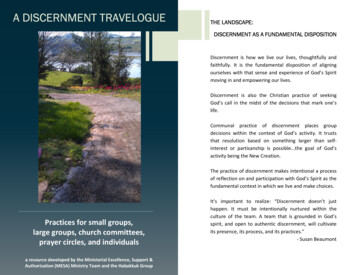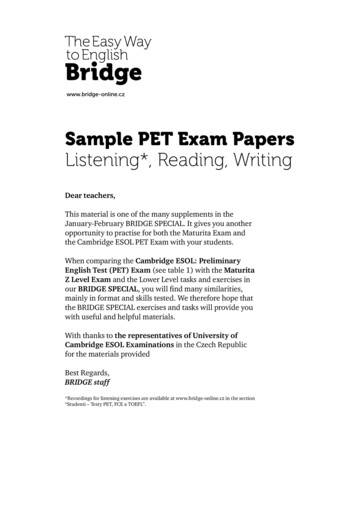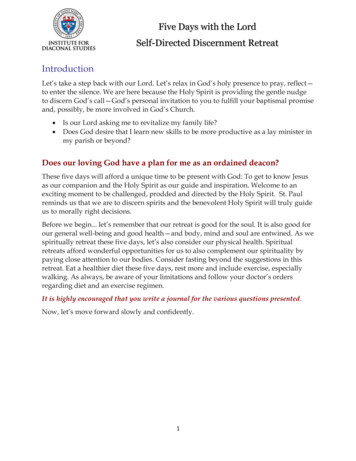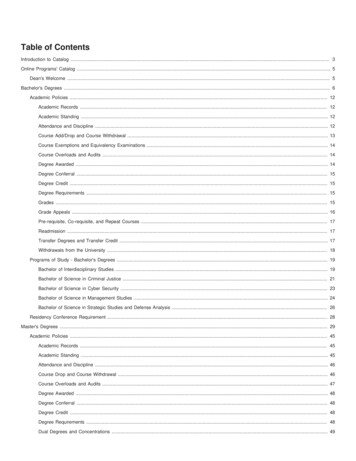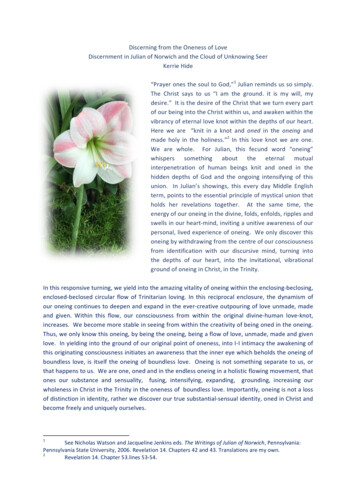
Transcription
Discerning from the Oneness of LoveDiscernment in Julian of Norwich and the Cloud of Unknowing SeerKerrie Hide“Prayer ones the soul to God,”1 Julian reminds us so simply.The Christ says to us “I am the ground. it is my will, mydesire.” It is the desire of the Christ that we turn every partof our being into the Christ within us, and awaken within thevibrancy of eternal love knot within the depths of our heart.Here we are “knit in a knot and oned in the oneing andmade holy in the holiness.”2 In this love knot we are one.We are whole. For Julian, this fecund word “oneing”whispers something about the eternal mutualinterpenetration of human beings knit and oned in thehidden depths of God and the ongoing intensifying of thisunion. In Julian’s showings, this every day Middle Englishterm, points to the essential principle of mystical union thatholds her revelations together. At the same time, theenergy of our oneing in the divine, folds, enfolds, ripples andswells in our heart-mind, inviting a unitive awareness of ourpersonal, lived experience of oneing. We only discover thisoneing by withdrawing from the centre of our consciousnessfrom identification with our discursive mind, turning intothe depths of our heart, into the invitational, vibrationalground of oneing in Christ, in the Trinity.In this responsive turning, we yield into the amazing vitality of oneing within the enclosing-beclosing,enclosed-beclosed circular flow of Trinitarian loving. In this reciprocal enclosure, the dynamism ofour oneing continues to deepen and expand in the ever-creative outpouring of love unmade, madeand given. Within this flow, our consciousness from within the original divine-human love-knot,increases. We become more stable in seeing from within the creativity of being oned in the oneing.Thus, we only know this oneing, by being the oneing, being a flow of love, unmade, made and givenlove. In yielding into the ground of our original point of oneness, into I-I intimacy the awakening ofthis originating consciousness initiates an awareness that the inner eye which beholds the oneing ofboundless love, is itself the oneing of boundless love. Oneing is not something separate to us, orthat happens to us. We are one, oned and in the endless oneing in a holistic flowing movement, thatones our substance and sensuality, fusing, intensifying, expanding, grounding, increasing ourwholeness in Christ in the Trinity in the oneness of boundless love. Importantly, oneing is not a lossof distinction in identity, rather we discover our true substantial-sensual identity, oned in Christ andbecome freely and uniquely ourselves.1See Nicholas Watson and Jacqueline Jenkins eds. The Writings of Julian of Norwich, Pennsylvania:Pennsylvania State University, 2006. Revelation 14. Chapters 42 and 43. Translations are my own.2Revelation 14. Chapter 53.lines 53-54.
In inviting us to discern the stirrings of love in this being oned in this oneing, Julian writes us an iconof discernment within the depths of our soul, towards the end of her showings. She draws us intoour soul’s depths within our heart, picturing our soul as like a city, that is Christ’s homeliest homeand everlasting wonning (dwelling). As words form in her understanding from the ground ofbeholding within her soul, she speaks of being: “stirred within to seek the high (transcendent) placewhere the Christ wonneth.”3 Like the Cloud author, Julian uses the word “stirred,” frequently, withall the delicate nuance of an inner perception within her spirit of the resonance of presence, of thecurrents of silence, shimmerings of stillness, and the flow of love in Love. Julian gives us aninsightful clue into the understanding that emerges about discerning these stirrings, inviting us intothe depths of our soul within our heart, giving us some valuable insights into the movement withinour soul. She sees that: “when our soul comes into itself, it does not abide in the beholding of itself,but all the beholding is blissfully set in God, who is the maker, wonning within. For in humanity’ssoul is God’s very wonning.”4Notice the energy of wonning within our soul that holds the dynamism of our soul being God’soneing place, and the stillness, the permanence of God’s wonning, or indwelling. The stirrings occurwithin the wonning, the indwelling, so that as we attend to the stirrings of love, and our soul, comesinto itself, we behold our soul beholding. A new level of reflexive conscious awakens. Our soul seesthat it does not behold itself, our beholding is “set” in God. The beholder who beholds ourbeholding is in God. “Set in God,” emphasises the permanence, the stability of our soul oned in Godbeholding. Subsequently, Julian sees that the brightest light that we see shining within our soulbeholding is the “glorious love” of the crucified and risen Christ.5 This beholding from within, beingset in God in our soul exudes joy. Joy in Julian, and joy in the Trinity. Our soul who beholds ourbeholding is illuminated with the risen light of Christ. This Christic beholder in us, who sees fromwithin being knit and onened in Christ exudes the deep wisdom of the Trinity. This is where we mustdiscern from, the light shining from the depths of our oneness in Christ. Therefore, in order todiscern wisely we must awaken the beholder of the beholder in us, and see with this luminous Christconsciousness. This luminous beholding in Christ exudes joy.Discerning from the Depths of OneingIn discerning, beholding the stirrings of love in the depths of our spirit, is also central in the Cloudauthor’s writings, as he teaches us to behold blindly, within the depths of our spirit from within ournaked self in God. He seeks to direct us to nothing more “than the mind of good God only, with areverent stirring of lasting love; so that means you get nothing but God.”6 What is central in all heteaches about discerning the stirrings of the Spirit within us is that we may be ever so softly withinthe depths of our spirit, within the mind of God.7 In order to discern the desire of God for us, our314.68.22-23.14.68.25-27.514.68.29.6Discernment of Stirrings, in Deonise Hid Divinite. ed. Phylis Hodgson. Early English Text Society.London: Oxford University Press, 1955, page 75. Lines 10-11. Translations are my own.7Cloud of Unknowing, in The Cloud of Unknowing and the Book of Privy Counselling. ed. PhylisHodgson. London: Early English Text Society, 1944, page 88. Line 20. Translations are my own.4
active conceptual mind8 needs to be softly knit into the depths of our spirit, into the intimacy ofbeing “knit to God in spirit, and in oneness (oneheed) of love and accordance of will.9 In otherwords, we turn our conceptual awareness within the depths of our heart into where we are knit toGod in the oneness of love, so intensely that our will accords with the divine will. And like Julian, thismystic draws on the image of the love-knot to describe this ground of our knitting as being “knit in aspiritual knot of burning love, in spiritual oneness and according of will.”10 This point of the love-knotof shared identity within the heart of our heart, that is so concentrated it is aflame with love, iswhere we must discern from within.This discerning author, gives us the most specific instructions on discernment in his letter, TheDiscretion of Stirrings, where he guides us into the depths of this flaming knot of love. He counsels:If thou keep whole the stirring of love that you feel by grace in your heart, and do not scatterfrom your beholding, then the stirring will tell you when you should speak and when youshould be still. This stirring of love will govern you discreetly in all your living, and teach youmistily.11These misty words give us some wonderful insights into the nature of this way of discerning fromour oneness in God in love. Importantly, he is showing us that although our beholding has a dark,meek, blind, character, this is not a darkness, an emptiness that is totally absent of spiritual senseawareness. We can be aware of intensely subtle stirrings within our spirit. He is oftenmisinterpreted as being so apophatic, that all inner awareness is totally obscured. On the contrary,although all the writings of the Cloud author affirm the importance of unknowing, of awarenessbeyond all conceptual ways of knowing, they are also essentially affective, they awaken our affectus,the aspect of our spirit where we darkly sense God’s loving within us.12 as when he says: “by loveGod may be gotten and held, but by thought never.”13 And, when he focuses on discernment, headds some important nuances to the way in which we receive loving participatory spiritualknowledge within the depths of our spirit when we behold and lean listily into the stirrings. Hesensitise us to the wisdom infused in our affectus by the spiritual senses, especially the spiritualsense of touch, by awakening the naked energetic field of transcendent awareness. The sensitivity inhow the Cloud author describes how our intellect gives way into the wisdom of unknowing infusedby blind beholding, into the most intimate and affective sense of the touch of loving stirrings in our8It is important to stress that this conceptual mind is not another being to heart-mind, though it islimited, diminished, partly blinded, so that it operates on a different level to the heart.9C 32.15-16. See also “oned to God in spirit and in love and in accordance of will.” C 120.7-8.10C 88:47.17-18; See also Letter of Prayer, page 56:13-14. Lines 16-22.11DS 75.10-18.12See, Carthusian Spirituality: The Writings of Hugh of Balma and Guigo De Ponte. Translated by DennisD. Martin, Classics of Western Spirituality. New York: Paulist Press, 1997, 1997, 7. This resonates with Hugh ofBalma, who quotes Vercelli about Deny’s Mystical Theology They (Pagan Philosophers) thought the highestcognitive power was found in the intellect, when there is another power that exceeds the intellect no less thanthe intellect exceeds reason and the reason exceeds imagination. This power is the principal affectio, which isthe spark of synderesis (the highest part of the human person) and which alone can be united to the HolySpirit. 145.13C 26.5.
spirit is astounding.14 In his Letter of Prayer he describes how we are: “touched in affection by thesensible presence of God as God is in God’s self.”15 And we see the inter-relationship between thesensible presence of a stirring and the touchings of the Spirit in Privy Counselling when the authoraffirms: “God’s goodness stirs and touches.”16 The touch of grace is the real presence of the HolySpirit that invites us to blindly see and nakedly feel the loveliness of God within the affectivity of ourspirit.17 Our author emphasises that we must enter into the depths of our heart, behold the stirringsof love and “keep the stirring whole.” We must resist trying to observe the stirrings as an object, ordissect, or analyse the meaning of the stirring. We must be subjectively within the stirrings.Stirrings of LoveTrue stirrings are always “plain.” They arise from God without cause, either from without or within.18These heart stirrings are origin-less, transcendent, because they arise from the unmade, naked beingof God. Sometimes stirrings can feel like they spring from God like a spark from coal, into our spirit,19with all the power of a sudden spark to ignite and set fire our affections. Mostly though, stirringshave a meek, passive quality that is quietly, “deep and pleasing.”20 Stirrings infuse a sense of: “greatease, true spiritual peace and a foretaste of endless rest.”21 Evocative adjectives, randomly appliedthroughout all his letters, help us further sensitize to the qualities of these divine stirrings. Hedescribes “a meek blind stirring of love,”22 “a devout and pleasing stirring of love,”23 “a secretlove,”24 “a perfect stirring of love,”25 “a little blind love,”26 “a meek blind stirring of love,”27 “a truestirring,”28 “a great stirring of love,”29 “a liking stirring.”30 All these delicately nuanced descriptors14There is a probable influence of Thomas Gallus here, who makes a distinction between the spiritualknowing that emerges from seeing compared to touching. Boyd Taylor Coolman, in The Spiritual Senses:Perceiving God in Western Christianity, Paul L. Gavrilyuk and Sarah Coakley eds. Cambridge University Press.Kindle Edition, 40, shows how in reflecting on Exodus, Thomas Gallus describes how God refused Moses’srequest for face-to-face vision as in: ‘no one can see God and live’; but in 1 Corinthians, Paul contrasted theclouded knowledge of God ‘in a mirror darkly’ of this present life with the full ‘face to face’ vision of God in thelife to come. Gallus resolves the difficulty with an appeal to a form of spiritual sensation: This [seraphic]refreshment does not occur through a mirror (speculum), but through the experience (experientiam) of divinesweetness, because taste and touch are not accomplished through a mirror , even though scripture says 1Cor. 13: 12: now we see through a mirror, John 1:18: No one ever sees God; [and] Exod. 33: 20: you will notsee me and live, [Scripture] does not say: you will not taste God or touch God. Thomas describes a spirituallysensuous experience, couched in the language of taste and touch in contrast to intellectual or rational knowinganalogous to physical sight, which allows for some form of perception of God.”15P 54.5-9.16Book of Privy Counselling, 155: 9-1417Wolfgang Riehle. The Middle English Mystics. Translated by Bernard Standring. London: Routledgeand Kegan Paul, 1981, 104, affirms that in Middle English texts the language of the mystical senses is notsimply metaphorical. They convey a spiritually felt sense of the presence of grace and yet, at the same time,draw us beyond the spiritual sense touch.18C 70: 23-24; 71:1.19C 22: 7-8.20C 26: 9.21DS 76.18-20.22C 22:18.23C 26: 9.24C 34: 9.25C 52:21.26C 58:8.27C 22: 18; 44: 20.28DS 68:18.
characterize the natural, pleasurable, inviting, luminous, transcendent quality of a stirring. “It ismarvellous the number of stirrings that may occur in the soul who is disposed to this work,” thedialogue continues, “as many as there are atoms in an hour.”31 Yet, in one stirring full of peace, wemay suddenly and perfectly forget all created things.32 One stirring from the fire of love, sparks ourheart, and draws us to be single heartedly present in the sovereign point of union in God. “Direct allyour beholding into this meek stirring of love in your will,” he advises.33 Notice how our beholding isdirected into the stirring. The beholder beholds blindly, enters into the spiritually felt sense of thestirring, and is moved beyond, beyond into the origins of the stirring, into God. Within the depths ofour spirit we apprehend through the oneing itself. The stirrings of love draw us into their origins indivine love, into an ineffable unknowing of the divine desire for us. We “know knittingly,”34 we knowfrom being knit within the depths of our spirit, in the knot of burning love, where our will is one withthe divine will. Here we are one in love.Thus we can say that with its origin in God, a stirring is an expression of the overflow of the ecstaticlove of the Trinity, flooding our heart in love. It flows from the love of God, reveals the loveliness ofGod, and draws us into a deeper relationship of becoming one in love in God. A stirring is of love,about love, and for love. It points us towards love and results in our loving more freely and fully.“Take good keep of stirrings of love,”35 our author invites. “Lean listily into this meek stirring of lovein your heart, and follow it forever-after.” He advises. “It will be a guide in this life, and bring you tobliss in the other. It is the substance of all good living, and without it no good work may be begun orended.”36False StirringsThese ever trustworthy stirrings of love are in stark contrast to the false stirrings that occur in ourconceptual mind and seek to attract our attention away from the ground of unknowing. Very early inthe Cloud of Unknowing, this wise teacher warns of the emotional and psychological tricks that canplague our mind, once we decide to truly respond to the desire of God, and so he gives some helpfuldescriptions of false stirrings that can come and go as we seek to discern. Colourfully, he personifiesthese disturbing stirrings as like a fiend, who uses clever trickery to captures our attention andscatter our mind. The cause of scattering, he reminds us, is that we become embroiled in ourthoughts, receive them and answer them, rather than simply notice thoughts and press them into acloud of forgetting.37 He has a very traditional emphasis on not engaging with thoughts as he knowsthat a diffuse, scattered mind is always confused and untrustworthy. Our author also warns againststraining, or trying too hard to make a decision, or to be right. “Do not strain your heart rudely,” hesays bluntly.38 “Work more with a list then with brute strength. For the more listily, the more meekly29P 50: 20.PC 166:14.31Also: “For even so many willing or desirings - and no more nor no fewer - may be and are in one hourin your will, as are atoms in one hour.” C 18:3-7.32C 22:1133C 93: 11-12.34This way of knowing “knittingly” is knowing that is beyond the curious searching of our wit. PC 144:3.35C 22. 5.36C 92. 14-17.37C 27: 9-4.38C 87:5- 6.30
and spiritual. The more rudely, the more bodily and beastly. Therefore beware.”39 He also cautionsus to beware of false stirrings that mascaraed under as an angel of light, warning: “it is necessaryand helpful to know its quality and not to forget its doleful deceits. For sometimes it will, that wickedcursed thing, change its likeness into an angel of light that it may, under the colour of virtue, domore harm.”40 Any stirrings that have their source outside ourselves, or in our conceptual mind,that are demanding, impatient, or draw us away from our centre, are counter movements. Theseillusive stirrings always sow the seeds of discord, disharmony, even though they seem ever so holy,or fair at first glance.Choose What is Hidden BetweenThus our wise teacher says that when we need to make a choice between two options, “I pray you,leave them both.” 41 He urges us to leave the curious beholding and searching of our analytical mindwhich sees from within a dualistic framework and looks to see which is better. He then becomesdecisively directive: “But do this! Set one decision in one hand and the other in the other hand andchoose the thing which is hidden between.”42 He repeats: “God is hidden between them and maynot be found in any of the works of the soul, but only by love in your heart.”43 Trustworthydiscernment will only be found in our heart, by the love of our heart. This directive to place onedecision in one hand and one in the other and “choose the thing which is hidden between” is at theheart of this way of discernment. We choose “the thing hidden between” by entering the cloud ofunknowing, drawing within into our heart, into the “deepest point of our spiritual beholding.”44 Thewords “hidden between” hold the paradox of how in order to awaken into the mind of Good Godonly, we must allow ourselves to yield beyond the control of our conceptual conscious mind thatsees us as separate from God, and drop into the “in-between” vast abyss-like void of unknowing.This liminal darkness of unknowing, dulls our discursive mind that sees us as separate from God’sdesire, until blindly, nakedly, we are in the oneness of love in God, within the divine desire. Thisoneness in love is felt obscurely, unconsciously within our spirit, as a blind stirring of love. In leavingaside all decisions, closing down our conscious mind and lovingly entering into the dark ground ofour heart, into God, the amorizing energies of Love arise from our unconscious depths in God. Lovethen take us beyond the alternatives of a dualistic response, into the shining wisdom of trinitariancreativity.Love’s stirrings draw us into the ground of the threefold flow of Trinitarian consciousness, into theunitive movement of the Holy Spirit drawing us deeper, beyond the initial dualistic choice, beyondinto enlightened wisdom. In these inner depths of our heart, we are one in spirit, one in theenflaming knot of love. Loving within the knitting of the union of our will, within the divine will, aspark springs from the divine being. This spark of enlightenment that emerges from this hiddenground of our oneness, where there are no dualisms, no opposites, is totally trustworthy as it arisesfrom within the naked being of God. This is where we discern from within, the naked awareness ofthe flaming knot of love within us. In leaving all conceptual awareness in a cloud of forgetting, while394041424344C 87:5- 9.DS 85:16-20.DS 71. 3-6.DS 71. 6-9.DS 71.22-24.DS 72: 5-6.
blindly beholding and single pointedly piercing through the cloud of unknowing, into the point ofour spirit, in the Holy Spirit, a heightened perceptivity emerges of our soul knit and oned to God inspiritual wisdom.45 We choose God. The path we must follow emerges in the unknowing of oneingwisdom, with a surprisingly vivid clarity. This Wisdom, that flows from the divine depths, knittingand oneing within our spirit always has a free, humble, unknowing, quality about it, as we flow inharmony with the movement of the Holy Spirit within us.This is the ground of creative freedom that Beatrice Bruteau speaks about that she identifies asessential for us to access if we are to actively participate in the incarnating of the Christ at this phaseof our evolutionary journey. We recall her words: “So when we come into being as our experienceof God’s union with us, or when we attain our destiny as an experience of union with God, what ishappening in both cases are the two self-giving activities are confluent.”46 In this convergence, in thisoneing, we exist “as a unitary overflowing act.”47 In these hidden depths of our oneing, where weexist as a unitary overflowing act, we can be confident of the wisdom that emerges and be acontinual creative act of divine loving. The wisdom and eloquence of this humble author magnifies,as he creates a melodious and memorable passage about discerning from the stirrings within thishidden ground of love:It is God for whom you should be still, if you should be still;and for whom you should speak, if you should speak;and for whom you should fast, if you should fast,and for whom you should eat, if you should eat;and for whom you should be alone, if you should be alone,and for whom you should be in company, if you should be in company,or whatever it may be.For silence is not God, nor speaking is not God;fasting is not God; nor eating is not God;being alone is not God; nor is company God; nor any other contraries.48After dissolving all the dualisms of opposing choices, our author then takes us into the hiddenground of the mind, or consciousness of God, into the luminosity of Love’s oneing. Echoes aboundof our being: “hidden in Christ in God” (Col3:3). His words rise from this hidden inner intimacy inone another:God is hidden between themand may not be found in any of the works of the soul,but only by love in your heart.God may not be known by reason.God may not be thought, held nor traced by understanding.But God may be loved and chosen with the true lovely will of your heart.Choose God; and you are silently speaking and speakingly silent,fastingly eating and eating fastingly45464748PC 145.3-6.Beatrice Bruteau, The Grand Option, Indiana: University of Notre Dame, 2001,75-76.Grand Option,116.DS 71:13-22.
and so forth 49In this hidden ground, within the heart-womb, of Love’s eternally spacious heart-womb, we indwellwithin an endless flow of being in one another, within an abiding, a union, a oneing that flows intoevery particle of our being. This oneing is like an in-spiriting, serene flow of light, disclosing a senseof being light infused matter. In this exquisite being hidden within, perception arises from within thesecret of inner silence, the privy wisdom of innermost stillness, and flows into the point, where ourdiscursive mind turns into the mind of my heart, as it turns into the hidden ground of Christ. Here,we are at home in the ground of our essential being. When we enter into this secret hiding placewithin our heart, into the unity of the hidden point of our oneing, we yield beyond into purepresence in one another. In this creative-union of our shared identity, we are the oneing.And so these delightful, harmonious words, that give voice to unutterable aspirations of love, callforth what is deeply hidden within our spirit as it sings of the joy of this lovely choosing of God. Thiswholistic consciousness of always choosing God in love, shifts our sense of what is important,making our oneness in God the critical central principle. This means that any decisions we makeshould enable us to evolve in becoming an expression of the divine, becoming more one, morewhole in Christ, in God. “It is God,” “choose God” rings like chimes in the cosmos. He affirms:such a lovely choosing of God, wisely letting go and seeking God with the pure will of a trueheart, between all choices, leaving them both when they come, and offering them to thepoint and prick of your spiritual beholding is the worthiest tracing and seeking of God thatmay be had or learned in this life.50Therefore the purpose of discernment is to single heartedly focus on the point of our oneness in Godso that we may have the mind of good God only. We seek to awaken our heart mind in God and torespond ourselves with a stirring of love. Both Julian and the Cloud author invite us to be the oneingthat creates communion and awakens communion consciousness.Implications of Discerning from Oneness for Spiritual DirectionThe gift of discerning wisdom is so desperately need at this time in our evolution, as we seem socaught in a dualistic mind-set that creates a demarcation between our everyday consciousness andour heart awareness. These writings of Julian and the Cloud author take us beyond this level ofconceptual consciousness into the heart-mind of God, into the hidden ground of oneing awareness.Though there are many consequences for discernment and the role of the spiritual director insupporting discernment, I will draw five essential implications.First, this way of discernment invites us to enter into the ground of our heart and awaken theluminous mind of our heart, with all its sensitivity that arises from our being one in Christ in theoneing of the Trinity. This means that all discernment must take place with the context ofcontemplation. Our role is to cultivate a silent, still, loving awareness that naturally arises from theground of our heart and to become more stable in seeing from within the creativity of being oned inthe oneing. Thus, we only know this oneing, by being the oneing, being a flow of love, unmade,made and given love.4950DS 71:22-72:1-2.DS 72: 3-7.
Second, intentional kenosis is critical in discernment. Our desire to choose God in all things mustalways be our only motivation. Judy Cannato drawing on the research of Lynn McTaggart reminds usthat, “the most essential ingredient in creating our universe is the consciousness that observes it.”51Quantum physicists are telling us that a subatomic particle remains in a state of probability until anobserver is involved and the observer helps to bring about that which is observed. This suggests thatour desire to choose God, and our preparedness to live in this loving kenosis of living from theground of our heart and being an expression of the divine mind, the divine desire, helps to foster theongoing revelation of the divine desire for ourselves and our world. Our intention emits light waves(biophoton omissions), that morph, create patterns of energy, and form a morphogenic field of lightand love. Our intention to choose God continues the creativity of the divine incarnating in creation.Third, these wise mystics highlight the difference in the energy field between oneing and scattering.There is a stark contrast between the controlled analysis of the conscious mind that seeks todistinguish and separate, compared to the deep, dark blind beholding in the hidden ground of love.In this way of discerning choices are made beyond conscious awareness in the ground of the stirringsof the love of the Trinity. Beatrice Bruteau speaks so powerfully of the illusive nature of thediscursive-mind that is innately scattered, diffused and reactive, that controls our environment,while our personal and collective heart-mind frequently lies dormant. In this highly establishednegation cycle, Beatrice explains, we see and make choices through the dualism of subject-objectperception. Moreover, although we can observe a situation, examine possible desirable outcomesand objectively choose amongst alternatives, the stimulation comes from within our discursive mind,activating what Beatrice identifies as a “choice freedom,” it looks like we are choosing, but we areblind to the categories that limit our capacity to choose freely. This “choice freedom,” is alwayslimited and though it manifests under the guise of discernment, it is not discernment. This choicefreedom arises from a subject-object mentality, abstractly, from outside our centre hidden in Christ,in God.52 Without even being consciously aware, we find ourselves locked in this negativity andimpotent within the reaction net of the karma trap of reproducing unhealthy patterns ofbehaviour.53 This negation cycle perpetuates a pattern of distinguishing, excluding and dominating.Fourth, the Cloud author encourages us: “Blissful is the one who finds this oneing wisdom thatabounds in this glorious working, with a lovely, wise and prudent spirit.”54 Both he and Julian inviteus to live in this bliss, to be luminous beings who glow with oneing wisdom that arises from theground of the threefold flow of Trinitarian
Discernment in Julian of Norwich and the Cloud of Unknowing Seer Kerrie Hide "Prayer ones the soul to God,"1 Julian reminds us so simply. The Christ says to us "I am the ground. it is my will, my desire." It is the desire of the Christ that we turn every part of our being into the Christ within us, and awaken within the

